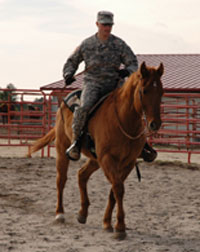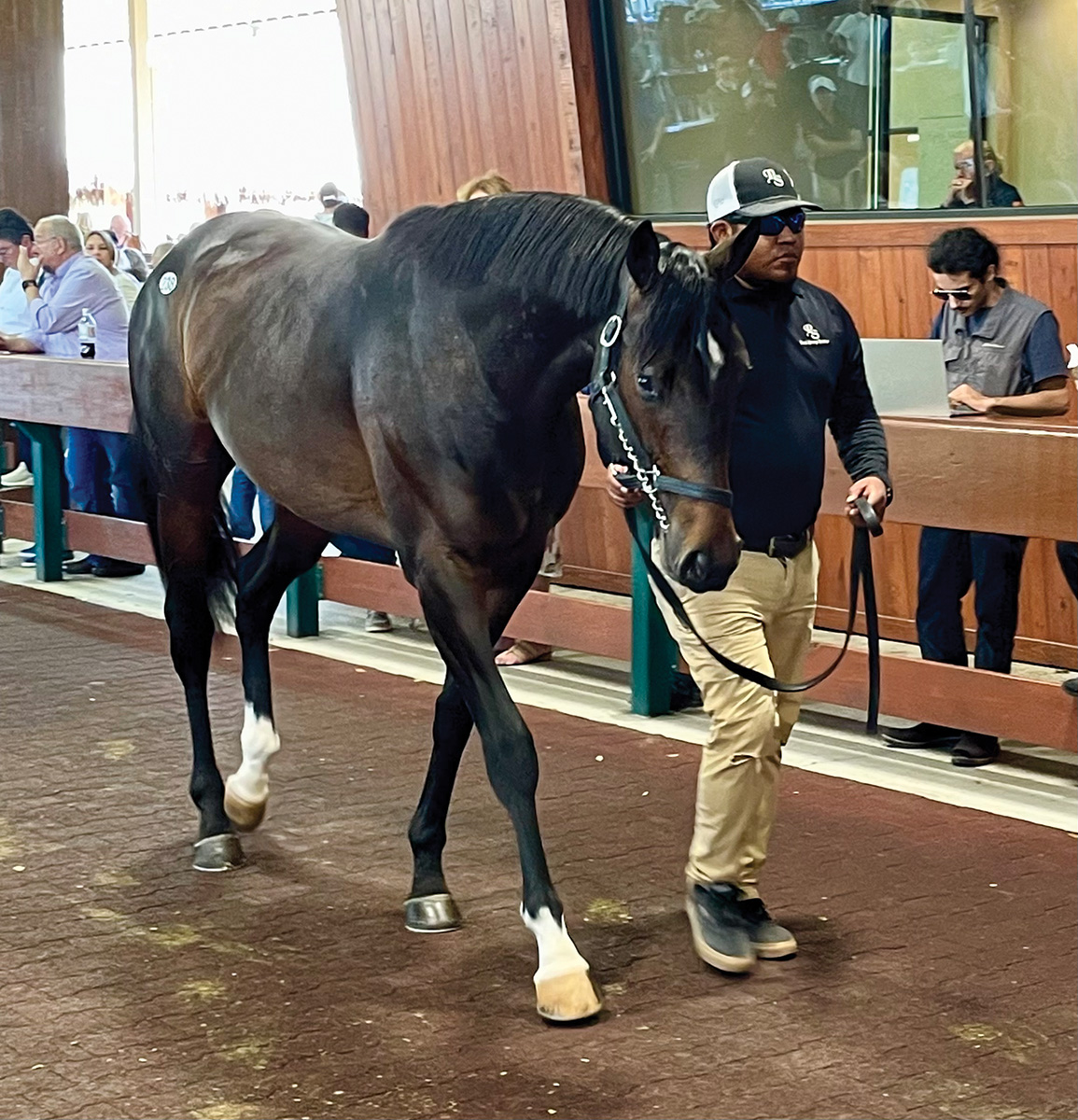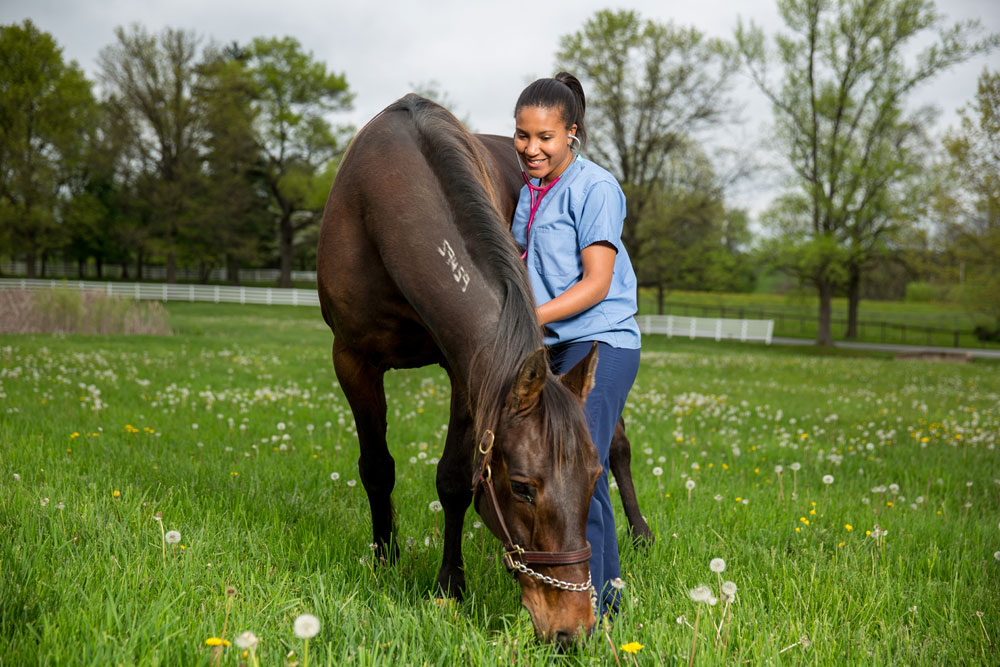Horse Illustrated: What is your job title and who do you work for?
Sergeant Joseph Eckhardt: I am Sergeant Joseph Eckhardt with the Lexington Kentucky Police Department.
HI: How long have you been doing what you do?
SJE: I have been a police officer for 17 years and with the Mounted Unit for 4 years.
HI: What role did you start out with in the Lexington Police Department?
SJE: I began my career in the Bureau of Patrol assigned to Central Sector, which is the downtown portion of Lexington, Ky.
HI: Do you have a riding background?
SJE: My riding background was very limited to trail rides and hopping on a friend’s horse at a farm from time to time. I had no formalized training in equitation, to be sure. It was me sitting on a horse and it telling me where it wanted to go, and me not knowing any better.
When I got to the Unit, I was in for a big surprise. What we do in the Mounted Unit is riding. We have to work together with our horse partners to overcome lots of obstacles they would rather run from in the busy downtown streets. We are fortunate to be in the Horse Capital of the World in Lexington, Kentucky, where there are several experienced horsemen willing to come to the facility and help us with our training. Officers coming to the Mounted Unit also receive 10 weeks of training in equitation, sensory training, natural horsemanship and ground work. In the Unit, we are capable of training new officers to ride and training the horses to be solid police mounts.
HI: How did you decide on this field?
SJE: The short answer is, the opening came available and I was just in the right place at the right time. In the Lexington police department, I have served in many different units and bureaus, doing anything from regular patrol to special assignments and investigations. The Mounted Unit is a very sought-after assignment–officers wait years for a chance to police from horseback.
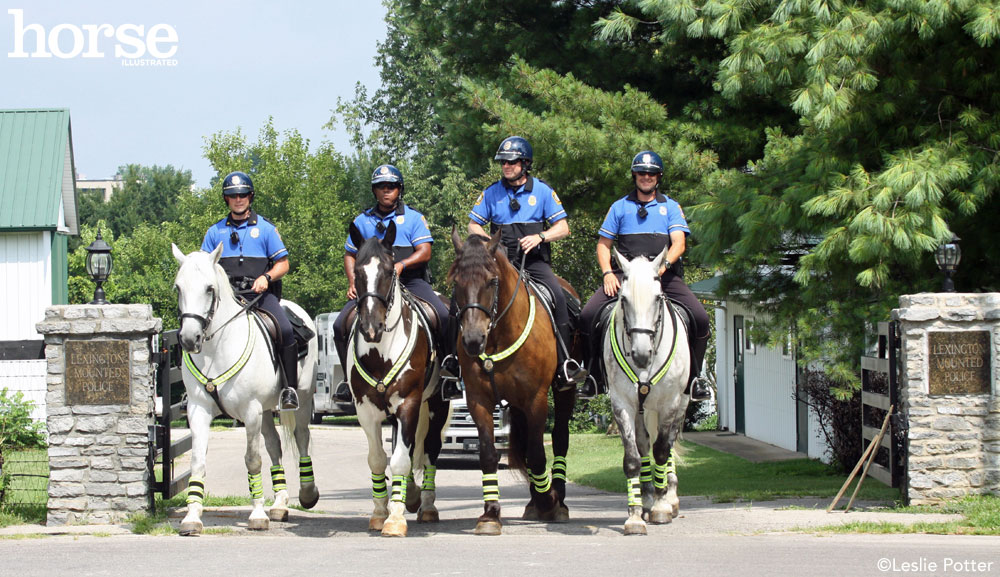
I always wanted a chance to be a mounted officer, but wasn’t sure if it was even possible because I had such little riding experience. During my career, there were openings, but I had chosen to apply to other specialized units instead because of my limited horse experience. When another opportunity presented itself, I was a sergeant and still didn’t have much riding experience, but knew since it was such a coveted position I would likely not get another chance in my career if it passed by, so I applied. This assignment made me a lot more nervous because I was not just a rider, but would be responsible for supervising the unit. The apprehension came from having little experience riding. However, I have good people who work for me and they helped me through it and continue to help me improve. I also have access to all the good horsemen who come to train us [the police officers] to be horsemen.
HI: What did you anticipate doing when you were younger?
SJE: Like any kid, I wanted to be a super hero who flew around in a cape. Not too realistic, so I picked the next best thing: police officer.
HI: What is your background – where are you from and where did you go to school?
SJE: I am from Middletown, Ohio–it’s a smaller city between Cincinnati and Dayton. I went to school at Middletown High School and then attended several different colleges before I made up my mind what exactly I wanted to do for a living. I bounced from Wright State University with a Computer Science major, to Miami University where I was a business major, and then finally went to Eastern Kentucky University, where I majored in Criminal Justice. The last college was where I met a Lexington Police Officer at a job fair and applied for a job. I had heard horror stories of being an officer, that the pay was too little and the stress too high, so I tried to pick a different career. None of the other careers seemed to interest me enough, and I finally resolved to be what I always wanted to be: a police officer. That was 17 years ago now and I have served in many different capacities in the police force. I have always truly loved my job and enjoy going to work each day.
HI: What is your background with horses?
SJE: My background with horses was very limited when I was a kid in suburban Ohio. I went on the occasional trail ride where I sat on the back of the horse while he went where he wanted to go. When I was 16, I worked for a lady who bred and sold high-dollar Quarter Horses. My responsibilities were mucking out stalls, moving horses around and the maintaining the grounds.
I never really did any true riding until the police department. I began truly riding in February 2012. We have a 10-week riding course, written and practical exams I had to pass, plus I went to the Mounted Police Seminar on classical riding taught by the Royal Canadian Mounted Police in Ottawa, Ontario. I have only been riding for 4 years, but during those years I have worked with horses 40 or more hours a week, developing my skills as a horseman. I still have a long way to go in my development, but I have logged quite a lot of saddle time, training and other types of horsemanship classes in those four short years.
It’s imperative that we are highly trained to handle a horse in some of the volatile situations we can find ourselves in as a mounted officer. In the Mounted Unit, we do all of our own training of the officers and of the horses to do the job of a mounted officer. We are very blessed in Lexington to have a lot of experienced horsemen who help us become better horsemen ourselves. In addition to the supplemental training of local experts, we send all of our officers to Canada for two weeks to attend the Royal Canadian Mounted Police seminar on classical riding and mounted policing. Officers from our unit also participate in other equine training and national competitions.
HI: Did you have any experiences that really stuck with you that made you want to do this job?
SJE: At the Fourth of July many years ago, I was serving as an officer here in Lexington assigned to the festival area downtown. A large disorder had started with a lot of people fighting and it was all the officers on the ground could do to restore order. Then we all heard the sound of metal horseshoes striking the asphalt as several of our mounted officers trotted up on their mounts to assist. Let’s just say the people that were fighting lost the will to continue and dispersed quite quickly, scattering in all directions. I thought then that I would really like to be in the Mounted Unit at some point.
HI: Are there many other places other than Lexington where you could do this job or is it very region specific?
SJE: There are a lot of police departments that have mounted units. Those departments have recognized the value of the horse as a benefit to the police agency.
In Lexington, we have the pleasure of hosting the National Mounted Police Colloquium every year, in partnership with the Kentucky Horse Park Mounted Police. This is an event in which we bring in experts in a variety of equine disciplines, from mounted policing techniques, search and rescue, equitation, troop drill, team building exercises, sensory training, and competition portions in equitation, obstacles and team events. The Colloquium is widely attended by police departments from around North America, averaging 85 officers every year. On the weekend following the Colloquium, we host the Civilian Clinic with the same instructors who taught at the Colloquium. This gives us an opportunity to share with the community our techniques in desensitizing our horses through natural horsemanship for police work. I believe these methods translate to every equine discipline because the horse does not change and will inevitably encounter something he is afraid of in any type of equine event that you enjoy. Our training helps the rider work together with the horse as a partner to overcome his fears. This event is the main fundraiser sponsored by the Friends of the Lexington Mounted Police, a nonprofit organization. The Colloquium and Civilian Clinic allow us to afford to purchase horses, travel to such a wide variety of training and adequately support our unit.
HI: Tell us more about the benefits of a mounted police unit.
SJE: We train from horseback to do everything an officer can do on foot: conducting field interviews, taking reports, arresting a suspect, performing defensive tactics, pursuing a fleeing suspect and aiding in crowd control. A mounted officer is elevated approximately 9 feet and can move the equivalent of what 10 officers on foot can, giving them an advantage during a crowd control situation. The entire crowd can see them and they can see the entire crowd. This plays to our advantage in spotting the main aggressor in the crowd. It also allows for the entire crowd to see us telling them to move when we begin asking them to disperse.
The most commonly occurring aspect of our job is the use of the horse in policing as a public relations tool. Unfortunately, our contacts with the community tend to be negative in nature, from issuing a speeding ticket, arresting a person, dealing with those involved in a traffic accident or a victim of a crime, or some other enforcement action. The vast majority of contact with police can be an unintended negative contact because of the bad situation and no fault of the officer.
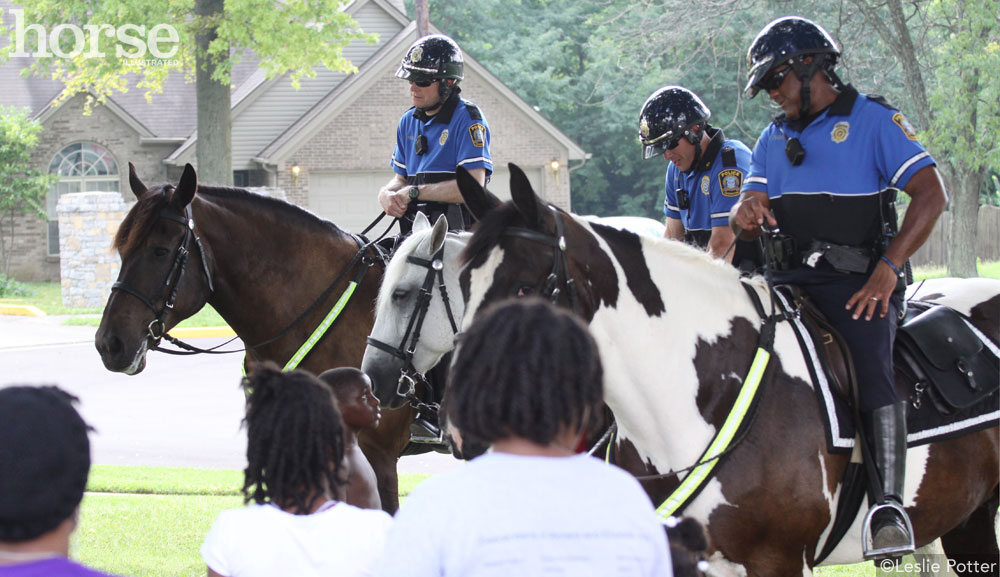
If two officers are parked in their cars in a lot, no one may come up to talk to them unless they are needing some type of assistance. If two officers are sitting on horses in the same lot, you would not be able to count the number of people who come up to them, wanting to pet the horses, speak to the officers or just admire their four-legged partners. This interaction is always an opportunity to connect with our communities. It makes us approachable, personable and it is a positive interaction with the community that we are so often lacking by the nature of our jobs.
HI: What do you think are key qualities for people who might want to go into your field?
SJE: The most important thing an officer has to be able to do is talk to people. You will be expected to do such a wide variety of tasks as an officer, but what it really boils down to is your ability to communicate with others.
HI: Can you please briefly describe what you do on a day-to-day basis (if there is a “daily routine!”)? What is your favorite part of your job?
SJE: One of the things I love the most about policing in general is that there is no “same old, same old.” It is always a different challenge each day. You add a horse into the mix with this variable, and you even get more challenges. In the Mounted Unit, our responsibilities include taking care of the facility, the pasture, each horse’s needs, grooming, general patrol, barn tours, parades and any special assignments. There are so many different things we do in the Mounted Unit that it’s difficult to pin it down to one thing specifically I enjoy the most.
HI: What is the most difficult part of your job?
SJE: The most difficult part of my job is keeping up with all the work that goes into taking care of a herd of horses. The horse is such a big and strong animal, but is incredibly fragile. It’s a fine balance to keep their environment, medical needs and feed schedules on track. No matter how hard you work at this, there is always something unexpected that turns up.
HI: What is one thing you learned or know now you never would have expected from this job?
SJE: With horses, you will never stop learning, but the biggest thing was how much patience is required to ride, train and work with horses. Communicating with horses is very much like speaking another language. I often compare it to this because I learned how to speak Spanish proficiently. In learning Spanish, I didn’t go to a one-week school to become proficient; it didn’t happen overnight, it took patience, I had to be intentional about practicing it and I am still developing my skills today. The same can be said about riding because what you are doing is communicating with the horse in its own language.
HI: What advice would you give people who are interested in pursuing a career with a mounted unit?
SJE: Have patience and really want to be a police officer first. If you’re not willing to serve as an officer without a horse, then your heart won’t be in it when you have one.
HI: What do you think you would do if you didn’t have this job?
SJE: This is a difficult question; I don’t see myself doing anything else and have been serving since I was 21. If I had to pick a profession other than policing, it would have to be something that was outside and not the same thing every day. My attention span wouldn’t allow me to do something redundant; a man’s got to know his limits. I am truly blessed with this job. I enjoy it and look forward to coming to work every day.
Policing isn’t for you? Maybe running a horse rescue, building cross-country courses, or something else will capture your interest. Find out! See more Careers in the Horse Industry interviews >>


